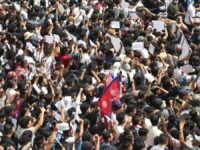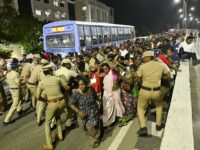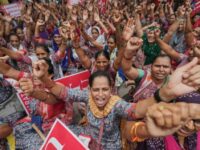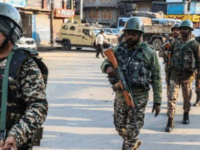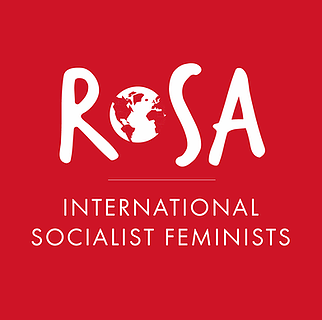Pakistan: Exorbitant Power Bills Trigger Countrywide Protests
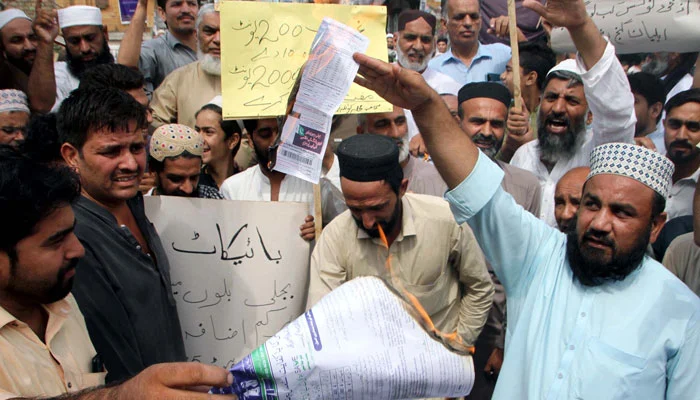
In recent weeks, Pakistan has been swept by mass protests, as people across the country have expressed their anger over the hikes in electricity bills enforced by the unelected caretaker government led by Anwaar-ul-Haq Kakar. What initially ignited in Pakistan-Occupied Kashmir on August 3 swiftly spread into numerous cities including Lahore, Rawalpindi, Attock, Karashi, Peshawar, Quetta, Taunsa, Nawabshah, Multan etc.
Weighed down by piling economic hardships, protesters have taken to the streets, blocking roads and even burning their electricity bills on the streets. On social media platforms, hashtags like #Burn_Electricity_Bills and #Civil_Nafarmani (=civil disobedience), have gained wide traction. The depth of public fury led the Peshawar Electric Supply Company (PESCO) to remove green license plates from its vehicles in fear of potential attacks from protesters.
The wave of demonstrations prompted the caretaker Prime Minister to convene an emergency meeting on August 27, directing the authorities to take “concrete steps” within 48 hours to alleviate people’s suffering. These promises proved empty, serving as a mere stall tactic and emphasizing the imperative for the protest movement to depend solely on its own strength. Just three days later, the Finance Minister stated that the commitments to the IMF were “non-negotiable” and that there was no fiscal leeway to backtrack. Sources within the Cabinet noted that even if the government were to consider breaking up the new bills into several installments, prior “permission” from the IMF would be required!
This reversal from the government, coupled with provocative statements from Kakar dismissing the inflated power bills as a “non-issue”, further fueled public discontent. On Saturday, September 2, a “shutter-down” strike effectively closed most bazaars and commercial activities, particularly in major urban centers like Karachi, Peshawar and Lahore. In some instances, public transportation workers joined the shutdown.
In Lahore, electricity workers have staged protests, demanding cuts in energy prices and measures to confront the severe staff shortages within the sector. This demonstrates the pivotal role these workers can play, aligning themselves with the street movement and thwarting the government’s plans. This is particularly crucial in a context where they are being scapegoated by the government and some of them have reportedly been targeted by enraged protesters.
Economic collapse
The eruption of protests in Pakistan comes as no surprise. Under the Pakistan Muslim League (Nawaz)-Pakistan People’s Party (PML(N)-PPP) outgoing coalition government led by billionaire Prime Minister Shehbaz Sharif, punishing austerity measures were imposed to secure funding from the IMF. This included an increase in the base power cost on July 21, part of the conditions for a $3-billion emergency loan negotiated two months ago with the imperialist institution.
Pakistan’s average electricity tariffs have surged by a staggering 76% over a single year, plunging the poor into unbearable circumstances, with power bills sometimes surpassing their wages or rent payments. This is occurring despite people enduring crippling power cuts in the scorching heat —some regions, like Balochistan, experience power shortages of up to 16 hours a day— and are already suffering under back-breaking general inflation levels.
Sharif stepped down as his Cabinet dissolved the country’s Parliament on August 9, paving the way for the current caretaker government. The latter is theoretically tasked with overseeing national elections but practically, it is mostly doing the bidding for the army —whose top brass is the real political king-maker in Pakistan. The anger of the masses was stoked when this “interim” government raised fuel prices on its first day in office.
The overall economic situation is dire. Pakistan’s GDP rate has plummeted from 6.1% to approximately 0.3% within a year. During the same period the Pakistani rupee depreciated by roughly 30% against the dollar, driving up the cost of oil and other imports. Factories and businesses are downsizing and laying off workers en masse. Import restrictions aimed at curbing the outflow of foreign exchange have led to major job losses, particularly in the textile sector, where an estimated seven million workers have been fired. Last year’s devastating floods have exacerbated the situation dramatically, leaving widespread destruction in their wake. Now both Punjab and Sindh are facing flooding again.
This confluence of crises has crushed the hope of many young people desperate to leave the country, leading to a mass exodus of Pakistanis abroad. In the first six months of the year alone, over 800,000 individuals have left, mostly to Gulf countries, setting a new record for emigration. Pakistan’s passport authority recently reported a huge spike in the daily average of passport applications.
Political crisis
The unfolding economic meltdown aggravates the major political crisis that has broken out in the open since last year. Former Prime Minister Imran Khan, once propped up by the military, fell from grace once he tried to free himself from its grasp, resulting in his State-engineered ouster from office in April 2022. As the country’s economy spiraled into crisis, Sharif’s government which assumed power following Khan’s removal —made of a fractious coalition of 13 parties— became increasingly unpopular.
Despite having also carried out austerity and pro-IMF policies during his tenure, Khan had maintained substantial support, especially among the urban youth and middle class. The absence of a genuinely pro-poor and working-class political opposition, coupled with his outspoken rhetoric against corruption, US imperialism and the military establishment, helped bolster Khan’s cause. His Tehreek-e-Insaf (PTI) party secured a critical by-election victory in the Punjab province late last year, marking a humiliating setback for the national government and its military backers.
Albeit a pro-capitalist figure, Imran Khan had become a populist liability for the weightiest sections of the ruling class; as the country’s most rated politician, he posed a potential threat in a general election. This backdrop set the stage for a campaign of repression orchestrated by the state apparatus against him and his party. His indictment and arrest over corruption charges by an Islamabad court in May of this year provoked important protests, some of which targeted military personnel and installations and stormed the houses of military figures.
The erosion of the military’s authority and symbols was more than the Generals could bear. They responded with a harsh crackdown, including mass arrests, military trials, and the torture of PTI supporters. Additionally, senior military officials faced disciplinary action, underscoring the extreme nervousness of the military leadership. This repression subsequently prompted a large number of prominent PTI cadres to abandon the party. Although Khan himself was released on bail within days, he was re-arrested in early August, and was handed a conviction that bans him from office for the next five years.
Undoubtedly, the profound crisis gripping Pakistan’s ruling institutions and main political parties has now emboldened people to take matters in their own hands. With a deeply unpopular interim government in charge, the date and fate of the next elections hanging in the balance, and an opposition hamstrung by repression and large defections, the Pakistani masses, driven to the brink by relentless austerity measures and the iron grip of the IMF, have decided to take action for themselves.
However, the recent crackdown on the PTI serves as a stark reminder that the military establishment will not idly tolerate challenges to its position and core interests. In the current climate of extreme political instability, the specter of an outright military takeover, though risky for the Generals, must be taken seriously. This peril further underlines the urgent need for the movement on the streets, and the working masses in particular, to intensify their independent organization, and prepare to mount a robust challenge to the economic, political, and military dominance of the ruling elite.
New “weak link in the chain”
After Sri Lanka, Pakistan stands as the new weak link in the chain of South Asian capitalism, and a stark embodiment of all the overlapping crises of the system. Within this context, the ongoing wave of protests serves as a beacon of hope, signaling the potential for workers, small traders, poor peasants, unemployed youth and all those crushed by capitalist society to rise against the unrelenting litany of injustices discharged upon them.
Millions of people are brutally impoverished to safeguard the vast wealth of corrupt generals, corporate bosses, landlords and politicians who reign over the country, and to service a mountain of debts the benefits of which ordinary people have seen nothing from.
ISA-India stands in full solidarity with the struggling workers and poor masses of Pakistan, and calls for an extension of the protests and strikes, and the coordination of a nationwide campaign of boycott of the exorbitant electricity bills.
We demand wages and benefits adjusted to the real cost of living, and an immediate halt to the cruel IMF-imposed measures, regressive taxes, privatization schemes, and crippling subsidy cuts. Furthermore, we demand comprehensive debt cancellation, encompassing not only the debts owed to Western-dominated institutions such as the IMF, the World Bank, and the Paris Club, but also the substantial Chinese loans, constituting nearly one-third of Pakistan’s current external debt. The terms of these loans have proven no less rapacious than those from the imperialist West.
We insist on the immediate release of all detained political activists, freedom of speech, and the right to organize and demonstrate freely, including within the workplaces —and stand for the building of fighting and democratically-run trade unions.
Crucially, we call for the nationalization under workers’ control of the key industries, largest land holdings and corporations (banking, cement and textile factories, defense production, real estate etc). This must include all private energy companies, to ensure affordable electricity for all households. These radical measures are vital for transitioning to the democratic socialist planning of the economy, eradicating extreme profiteering and corruption that have plagued Pakistan for far too long, and steering the country away from the precipice upon which it currently teeters.

